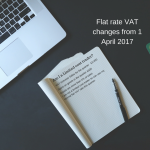This is our second blog about rental income. Here we consider the new restrictions for tax relief on mortgage interest. Click here to see our first blog.
Interest relief from 6 April 2017
In the 2015 Summer budget HMRC announced that they would be restricting tax relief on mortgage interest from 6 April 2017 to 20% even for higher rate or additional rate taxpayers..
Who will it affect?
It applies to individuals, trusts and beneficiaries of deceased persons estates.
It does not apply to companies, landlords of commercial property or furnished holiday lets.
If you are a basic rate tax payer this will not have an impact you. However, if you are a higher or additional rate tax payer it could result in a much higher tax bill. This will particularly be the case if your properties are highly geared (see example 2).
How does it work?
The tax relief restrictions will be tapered over the next 4 years as follows:
2017/18 The deduction of allowable finance costs will be restricted to 75%, with 25% being available as a basic rate income tax deduction.
2018/19 The deduction of allowable finance costs will be restricted to 50%, with 50% being available as a basic rate income tax deduction.
2019/20 The deduction of allowable finance costs will be restricted to 25%, with 75% being available as a basic rate income tax deduction.
2020/21 100% of allowable finance costs will be restricted to basic rate income tax deduction
Example 1
Adam, a higher rate taxpayer, pays mortgage interest of £10,000 on his rental properties. The tax relief that he will be able to get over the next few years is as follows:
2016/17 £4,000 (£10,000 x 40%)
2017/18 £3,500 ((£10,000 x 25% x 20%) + (£10,000 x 75% x 40%))
2018/19 £3,000 ((£10,000 x 50% x 20%) + (£10,000 x 50% x 40%))
2019/20 £2,500 ((£10,000 x 75% x 20%) + (£10,000 x 25% x 40%))
2020/21 £2,000 (£10,000 x 20%)
This means that by 2020/21 Adam will be paying an extra £2,000 of tax per year. If Adam were an additional rate taxpayer he would be paying an extra £2,500 per annum.
Under current rules the mortgage interest is deducted from the rental income figures in the same way as other rental expenses such as repairs and agents fees. Under the new rules the mortgage interest will be added back and tax relief will be given by way of an income tax reducer.
This could push basic rate tax payers into the higher rate tax band. It could also mean that individuals lose their tax free personal allowance and also have to pay back their child benefit.
Example 2
Belinda’s only income is £125,000 from rent received before a deduction of £85,000 for mortgage interest. In 2016/17 her tax liability after deducting the personal allowance of £11,000 would have been £5,800.
From 2020/21 Belinda won’t be able to claim a deduction for mortgage interest so her taxable income will be £125,000. This will result in her losing her personal allowance and she will also become a higher rate taxpayer. For comparison purposes we will assume that the 2016/17 rates continue to apply. Her tax liability will be £26,600:
Rental profits before mortgage interest £125,000
She will not get a personal allowance as her income exceeds £122,000.
Income tax due at basic rate (£32,000 x 20%) £6,400
Income tax due at higher rate (£93,000 x 40%) £37,200
Less basic rate credit for mortgage interest (£85,000 x 20%) (£17,000)
Income tax due £26,600
This is an increase in tax due of £20,800 compared to the current rules. It means that she will pay tax of 66.5% ( 14.5% in 2016/17) on her rental profits and will reduce her net income from the properties to £13,400 £34,200 in 2016/17).
In addition, if Belinda received child benefit she would have to pay this back under the new rules as her income is over £50,000.
Is there anything that I can do to avoid this additional tax?
If the loan interest is minimal then, unless you sell the property and invest in something else, unfortunately you will just have to pay the extra tax.
If your properties are highly geared (such as with Belinda above) you might need to sell off some of your property portfolio in order to repay your mortgage.
You could move from residential lets to commercial lets as the tax relief restriction does not apply
Alternatively, you could consider furnished holiday lets (see our first blog).
You could put the properties into a limited company. However, this is likely to trigger a capital gains tax and a stamp duty land tax charge based on the market value of the properties. It is therefore only worth doing in certain circumstances. In addition, the interest rate that the bank will charge on the mortgage is often higher through a limited company.
If you are concerned about these new rules and would like us to calculate the additional tax liability please contact us on 01452 260960 or [email protected].









